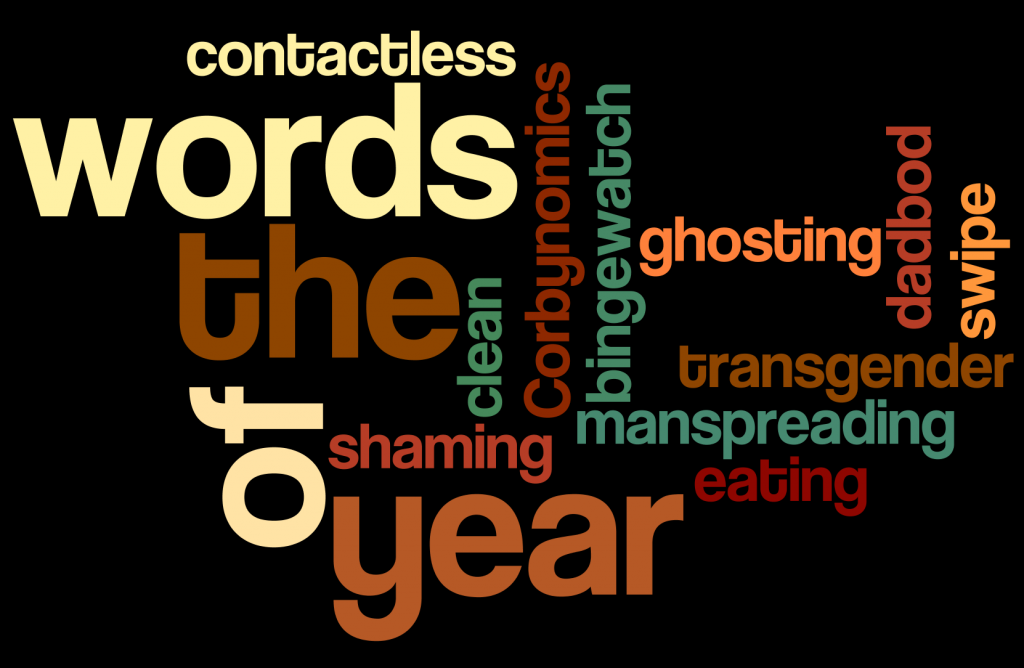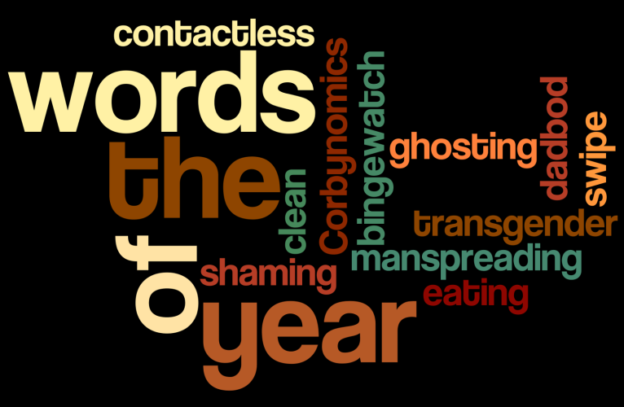In this series of three new episodes Amber, Paul and I talk about a list of the 10 Words of the Year which have been added to the Collins English Dictionary. We’re going to explain the words and discuss the issues behind them and I’ll also explain and clarify a lot of the language you’re going to hear in our conversation.
 [DOWNLOAD]
[DOWNLOAD]
Links
Article in The Guardian about the 10 Words of the Year
Collins Dictionary Q&A about the Words of the Year
Transcript to the Introduction and some notes for language analysis
Hello everyone – welcome to another episode of LEP. I hope you’re doing well… etc.
This introduction is being recorded on 18 November, on a Wednesday, but the rest of this episode and the other 2 episodes in this series were recorded a couple of weeks ago.
This episode is all about the Collins Dictionary Words of the Year 2015.
What’s that?
let me break it down.
First of all, Collins are a publisher of dictionaries, and so it’s their job to monitor the usage of words in order to decide which words should be added to the dictionary every year. They do this by noticing new words and seeing how often they have been used in the last 12 months. They then pick some of the more commonly used new words and add them to the dictionary. These are their ‘words of the year’.
How do they monitor the words? They have a special database of word usage called a Corpus. This is a quote from the Collins website:
“This evidence is based on our 4.5-billion-word database of language called the Collins Corpus. The words in the Corpus are taken from a huge range of sources of spoken and written English, including newspapers, radio and other types of media, from all over the world.” Link here.
The ‘words of the year’ list is an interesting way to identify trends in language, but it’s also quite revealing about modern British life because these are the things we’ve been talking and reading about.
Some people complain that these words aren’t serious enough, and that adding them to the dictionary is an example of the decline of language in some way. I think it’s fine to add these words into the dictionary because they just reflect changes in culture and in the end with new words needed to explain new concepts. Also, we need a record of the words people are using – especially if you’re a learner of English. You want to be able to learn the real English that people actually use, don’t you? Then you’ll want the dictionary to include the words that people really use. It’s not Collins intention to decide if people should or shouldn’t use these words, rather to see which words are being used a lot just so that they can be added to the dictionary to reflect the language as a living thing.
As ever I’m curious to know what you think about these new words. What do you think of Collins’ list? How is the dictionary managed in your country?
In this episode, Amber, Paul and I are going to go through all the words in this list, explain what they mean and discuss the issues that relate to them. This episode is also going to be a kind of review of the trending issues of the year.
As usual our discussion is pretty fast and busy, which is normal when friends discuss things.
To help you to understand everything and to give you a chance to maximise your learning from this episode I’ve decided to break up the discussion into chunks.
What’s a chunk? It’s just a substantial piece, a part, a lump. Like, a chunk of meat, tear off a chunk of bread from a loaf, a chunk of rock, you can also talk about chunks of language – like fixed expressions or phrases. In this case, we’re talking about chunks of a conversation.
What I’m going to do is play you each chunk of the discussion and then explain some of the language you heard. That way you’ll understand and learn much more.
I really think this is the best way to do it because you’re getting the best of both worlds – you can listen to our natural and spontaneous conversation, and then I’ll break it down to help you understand everything and learn even more from our conversations.
This episode contains just one conversation chunk, and it’s just the pre-chat we had before we even talked about any of the words of the year! In fact, I started recording and said hello to Amber and Paul, asked them how they were, and we started chatting about different stuff like the weather and the November 5th and we talked before dealing with the words of the year. However, this pre-chat is so full of language content that it has taken up the whole of this first episode.
It’s a bit ridiculous – you won’t actually hear us discussing the words of the year in part one! So, before we listen to the pre-chat, let me just list the words of the year for you now, even though you won’t hear us discussing them until part 2 of this series. I like to make things complicated.
OK, so the Collins Words of the Year are (in reverse order – and all these words will be explained and discussed in this series of 3 episodes – you might not understand them now but you will by the end of the series I promise)
transgender, manspreading, contactless, swipe (left or right), ghosting, clean eating, Corbynomics, shaming, dadbod and binge-watch.
I will only say those words once. You will hear them again, and hear explanations, later in this series, but for now, let’s listen to the pre-chat I had with Amber and Paul
Pre-Chat
This includes stuff about climate change, November 5th, and some other things. So, let’s finally start listening to the conversation shall we? (I do go on a bit don’t I?)
Listen to the pre-chat
Language Analysis: Pre-Chat (The bits in brackets are notes for my comments)
Conspiracy theories (Paul talks about climate change as if it’s a conspiracy theory)
It’s a hot topic.
Is it a conspiracy theory? (upward intonation for surprise, doubt)
Some people say that climate change isn’t a thing.
some people deny climate change.
(climate change deniers / to deny climate change)
We are exacerbating the environmental trend.
We’ll be dead before anything bad happens.
We might not be (elision).
Would it be bad if we were still alive in 100 years? (pron – weak sounds)
There are already too many people (pron)
China – they’re getting rid of the one baby ban (a ban on having more than one baby)
Old people who are in retreat (he means in retirement)
China should open it’s arms to Syria (an interesting political idea – but I didn’t want to talk about it because it’s a sensitive topic and I didn’t want to go down a rabbit hole – get sidetracked).
It’s unusually warm, which is kind of nice in a way because we don’t have to wear big coats and everything. (pron, but also using a relative clause to refer to a while clause).
There was a plot to blow up the houses of Parliament.
1605 (how to say years – normally divide it in two, except: when it’s 05 06 etc, 1900 1800 etc, 2000-present = “two thousand and…”)
Passives – Guy Fawkes and his gang were caught in the act of trying to blow up Parliament. He was sentenced to be hung, drawn and quartered.
And we’ve never forgot. (Nursery rhyme. “Forgot” isn’t it “forgotten”. Amber is referring to the old rhyme. Forgot here is poetic licence – it should be “forgotten” but that’s ok because of the poem and it’s old)
Words of Nathalie Portman there (Paul is referring to the film V for Vendetta which takes place in the future and has a character similar to Guy Fawkes. You hear the rhyme in the film. Obviously the quote is not from Nathalie Portman. In fact it’s an old rhyme from English folklore – we don’t know who wrote it)
http://www.potw.org/archive/potw405.html
Amber talked about the Lewes fireworks. http://www.lewesbonfirecelebrations.com
They make effigies and burn them. It’s very pagan.
Didn’t life change after that? (downward intonation – it’s a rhetorical negative question – it means – “life changed a lot after that, didn’t it”. “Didn’t she do well?” “Didn’t we have a good time?”)
(Obviously, 9/11 changed more than just the bottles of water not being allowed on planes and it was a very tragic event)
(Everyone laughed – not because 9/11 was funny, but because I was stuck in a serious topic suddenly and it was difficult for me to somehow get from this serious topic to the main topic – The Collins New Words of the Year.)
“How do I transition this to the actual theme of the podcast?”
“How do I get away from this potentially sensitive subject, which obviously is very serious, you know I don’t mean to make fun of THAT” (Features of spoken English – unfinished sentence, relative clauses, connected speech – all of it, and sentence stress)
2018 is when the next physical dictionary will be brought out. Some of these words may end up in that dictionary too. (phrasal verbs)
It depends if the words stand the test of time. (expression)
Article link: http://www.theguardian.com/books/2015/nov/05/binge-watch-2015-word-of-the-year-collins
End of the pre-chat.
End of Part 1: We haven’t even started talking about the words of the year yet!
Part 2 will be available soon.
[socialpoll id=”2310152″]

![]() [DOWNLOAD]
[DOWNLOAD]

